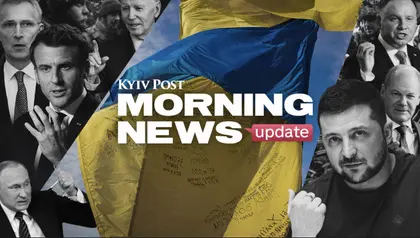Highlights:
- Zelensky addresses constant Russian aerial attacks on civilian attacks in nightly address
- Estonia moves on yearly plan to fund Kyiv with €120 billion euros in security funding
- New Ukrainian Consul General Appointed to Toronto in Canada
- Security Service nabs “informant” of Ukrainian artillery position in Donetsk region
- Two years since photo-journalist Maks Levin killed in early days of Russian all-out invasion
- Washington war analysis center says Ukraine open to “vulnerabilities” amid weapons shortage
President Volodymyr Zelensky emphasized the speedy “elimination of the consequences of Russian [airborne] strikes and on providing assistance to the victims,” he said in his nightly address to the nation on March 13.
JOIN US ON TELEGRAM
Follow our coverage of the war on the @Kyivpost_official.
He specifically mentioned the Donetsk regional town of Myrhorod that saw two civilians killed and five injured reportedly by a Grom-E1 projectile overnight on March 12 that struck a five-story residential building.
“My condolences to all those who have lost loved ones,” Zelensky said.
Three people were killed and at least 38 hurt in another Russian aerial attack on the Dnipropetrovsk regional town of Kryvyi Rih overnight on March 12-13, the oblast’s governor, Serhiy Lysak said.
The United Nations has recorded close to 30,000 civilian casualties as a result of Russian attacks, about 10,000 of whom have been killed between February 2022 and February of this year.
Estonia is exploring avenues to get more than a $100 billion of military aid to Ukraine on a yearly basis, the Baltic country’s permanent defense ministry secretary, Kusti Salm, said, as cited by Euractiv.
It is a “ballpark figure for what should be enough for Ukraine to with the [unprovoked Russian] war,” said 39-year-old Salm.
If the 50-plus countries in the US-led Ramstein coalition of countries that support Ukraine “militarily allocate that percentage, it would surpass €120 billion ($137 billion) per year,” he noted.

Zelensky Meets CIA Director William Burns in Ukraine
Ex-Foreign Affairs Ministry spokesperson Oleh Nikolenko was appointed as consulate general in Toronto, Canada, the nation’s most populous city that hosts about 11 percent of people who identify as Ukrainian, according to Statistique Canada.
It also is home to one of the most organized Ukrainian communities and the World Ukraine Congress, the global umbrella advocacy group, is based there.
After Russia’s full-scale invasion in February 2022, more than 200,00 Ukrainians fled to Canada, public broadcaster CTV News says.
Nikolenko, 38, previously was the vice-chair at the United Nations’ Committee on Information and also the spokesperson of his nation’s permanent mission to the New York-based global body that was founded after World War II to maintain peace across the world.
In his new role as a diplomat, he named five priorities that include drawing aid to Ukraine’s war-stricken “economy, [its] reconstruction of destroyed infrastructure…cooperation with Ukrainian organizations in Canada and [engage in] public diplomacy.”
An informant in the Donetsk region was arrested and subsequently sentenced for providing coordinates of Ukrainian artillery positions to invading Russian forces, the Security Service of Ukraine (SBU) said on March 13.
Based on the guilty party’s information, “Russians had planned a rocket and drone attack on combat unit locations,” the SBU, the country’s main counterintelligence agency, said.
A court sentenced the collaborator to 12 years in prison after cooperating with investigative authorities.
Award-winning war photographer Maks Levin was killed two years ago as he was in the Kyiv regional village of Huta Mezhyhirska, leaving behind a wife and four children. The renowned visual journalist was a mainstay contributor to Reuter’s and other news publications and survived the siege of Illovaisk in Donetsk Oblast in 2014 as he covered events.
His Facebook timeline is still live and people have been leaving behind messages of commemoration. Levin’s body was eventually found on April 1 in the aforementioned village north of Kyiv on April 1, 2022.
The prosecutor general’s office then said that he was “killed by servicemen of the Russian armed forces with two shots from small arms,” an allegation that the Kyiv Post could not independently verify.
President Zelensky posthumously awarded him the Order of Courage “for personal courage and selfless actions shown during the coverage of Russian aggression.”
Washington, D.C.-based Institute for the Study of War (ISW) said in its daily war report that “Ukrainian prioritization of the sectors most threatened by intensive Russian offensive operations could create vulnerabilities elsewhere that Russian forces may be able to exploit to make sudden and surprising advances if Ukrainian supplies continue to dwindle.”
Multiple countries have stated that Ukraine has had to ration its use of heavy weaponry as Russia attempts to gain the momentum, having prepared for the war for years and evades sanctions to procure weaponry and components for domestic manufacture.
“Russia’s retention of the theater-wide initiative increases the risks of such developments by letting the Russian military command choose to increase or decrease operations anywhere along the line almost at will,” ISW said in a daily war update.
You can also highlight the text and press Ctrl + Enter






